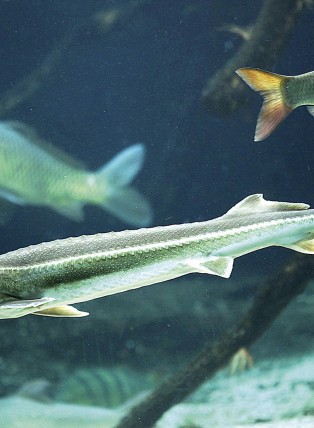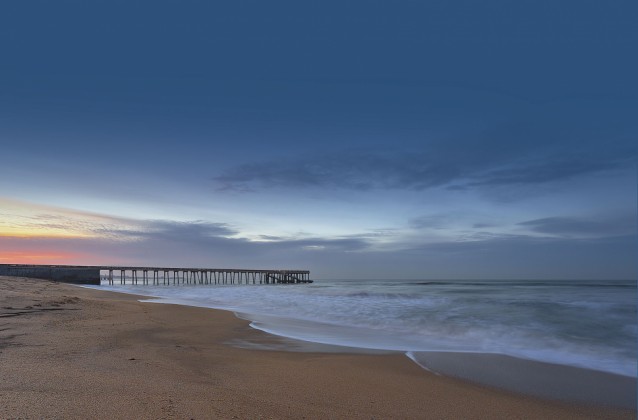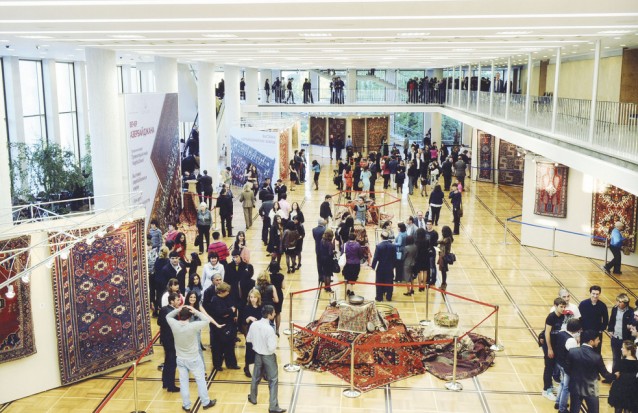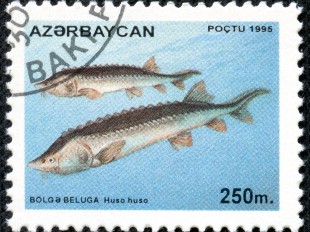The first trilateral summit of the leaders of Russia, Iran and Azerbaijan in Baku on 8 August 2016 was a geopolitical success for Azerbaijan. The most important task to resolve at the summit concerned construction of the North-South transport corridor, which should guarantee an overland connection between the economically rapidly developing south of India and Persian Gulf with northern and western Europe.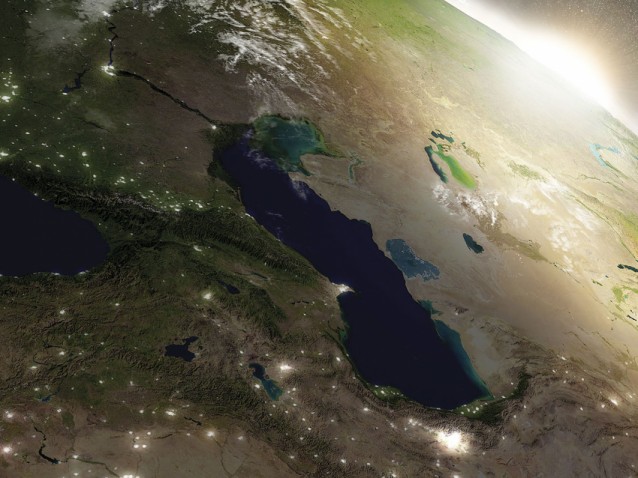 An exaggerated view of the Caucasus and Caspian region from space Photo: Anton Balazh/Shutterstock.com
An exaggerated view of the Caucasus and Caspian region from space Photo: Anton Balazh/Shutterstock.com
This transport corridor is an alternative to the Suez Canal, given that the latter is expensive and very long. The North-South transport corridor will allow for products from the south of India to reach northern and western Europe via a route half the length, sharply reducing logistical delays. The 7,200-km long transport route will go from India’s huge industrial region of Mumbai to the Iranian port of Bender-Abbas via sea, then by rail to Rasht, from there by road to Astara and then on the Azerbaijani and Russian rail networks to northern and western Europe.
Today the Rasht-Astara part is served by road, so the transport corridor is not working to full capacity. There are too many logistical obstacles: sea-rail-road-rail. In order to make it possible to fully restore the rail connection from the Bandar-Abbas seaport, construction needs to finish on the small Qazvin-Rasht part and, most importantly, the Rasht-Astara part, which is 172km long, must be built. This is not so expensive in financial terms, but after the transport corridor has been put into action, it will become an important engine for developing all the economies connected.
It is thought that the North-South corridor could significantly stimulate trade cooperation between the fast developing economic centre in the south of Asia and the traditional economic centre of northern and western Europe. At the same time, it should give serious impetus to the economic development of the transit countries, and above all of Azerbaijan.
Azerbaijan is the key point for the flow of Indian and Iranian products to European and Russian markets. And since relations between Russia and India are experiencing a new high, and India is becoming ever more interested in cooperating with the Eurasian Union, then several product flow routes arise within the North-South corridor. The first is India and northern and western Europe, the second is Iran and northern and western Europe, the third is India and Russia and the fourth is Iran and Russia. A fifth stream could arise from China. This is because China, if this transport corridor functions successfully, will include it in a section of its grand Silk Road project.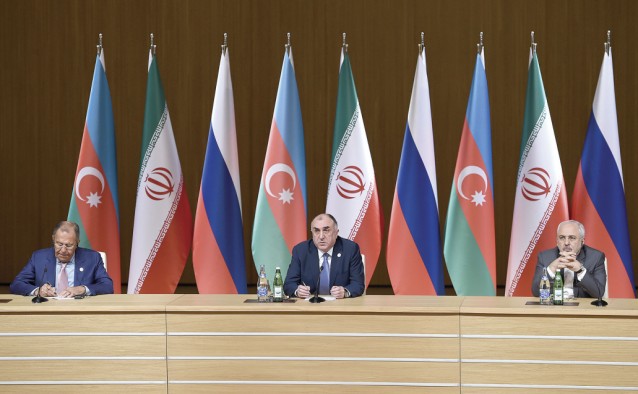 The foreign ministers of Russia, Azerbaijan and Iran, Sergey Lavrov (left), Elmar Mammadyarov (centre) and Javad Zarif (right) respectively, during the Baku trilateral summit on 8 August Photo: Azertaj
The foreign ministers of Russia, Azerbaijan and Iran, Sergey Lavrov (left), Elmar Mammadyarov (centre) and Javad Zarif (right) respectively, during the Baku trilateral summit on 8 August Photo: Azertaj
Beyond North-South
Such was the main subject of the meeting, but besides the North-South transport corridor, the leaders of the three countries also considered the trilateral trade infrastructure accompanying the corridor, since in order to implement this project cooperation between Russia, Azerbaijan and Iran also needs to develop. Firstly, it is important to get working relations up and running between the three countries’ governmental structures, the large corporations participating in the project, and also the banking structures carrying out financial operations.

photo (above): donikz/Shutterstock.com
The second area of focus is the deepening of communications between the governmental and commercial structures of the three countries, and the third area concerns developing trade between the three countries directly along the overland corridor and via the Caspian Sea, where there is a desperate need to develop the sea infrastructure to increase flows of commercial transportation and tourism. Besides this, economic cooperation will allow the development of political trust. And such trust is also essential in the fight against terrorism and resolving regional conflicts.
An important point that receives little attention is that by holding the trilateral summit Azerbaijan can strengthen its position in resolving the Nagorno-Karabakh conflict. This is because up to this point we have seen how cooperation has come together in the Moscow-Yerevan-Tehran format, but now the Moscow-Baku-Tehran triangle is forming, which allows Baku, if not to completely squeeze Yerevan out from cooperating with Moscow and Tehran, then to significantly affect it. Especially since for Moscow and Tehran cooperation with Baku is, for economic reasons, a lot more attractive than cooperation with Yerevan.
In such a way, the implementation of the North-South transport corridor and in particular the trilateral summit demonstrates how Azerbaijan’s growing economic influence leads to growing political influence.
Caspian issue
A separate aspect of the meeting was undoubtedly Caspian cooperation. All three countries are Caspian states with claims on the Caspian Sea. However, there are several unresolved issues, not least the status of the sea itself. Iran has a particular position on this issue which differs from that of Russia, Azerbaijan and Kazakhstan. Therefore, every summit includes negotiations aiming to bring the positions closer together and to smooth over disagreements.
However, there are some themes of principal, upon which all the Caspian states agree. Among them is a concern not to allow other countries to base military contingents in the Caspian basin. It is clear that above all this relates to the United States, which tries in every way to guarantee its military presence in strategically important regions. Strengthening this principle is extremely important.
Besides, within the Caspian issue, aside from communications problems, oil and gas occupies a very important place. It is essential to have an effective legal framework so that hydrocarbons can be extracted and exported without any obstacles. For this, cooperation needs to be strengthened between the Caspian countries. At the moment this sort of cooperation exists at a high level only between Russia and Azerbaijan, which serve as an example for other countries.
In relation to cooperation over the Caspian, several other problems which have not yet received the attention they deserve are significant. President Putin has already mentioned this, but at the moment little is being done regarding the use of bioresources from the Caspian Sea. The economic potential of these bioresources could bring our countries revenue comparable to the revenue generated from exporting hydrocarbons. The Caspian Sea is a huge reservoir for valuable fish and other resources. Symbolic of this are sturgeon. However, they have fallen victim to illegal poaching and their numbers are consistently declining. Their population could be significantly increased if this was placed under control.
Some experts believe that a way out of this situation, which would simultaneously increase the revenue of Caspian countries from bioresources, could be to establish a transnational corporation. This corporation would receive exclusive rights to use the bioresources in industrial quantities, and the profit would be divided according to investment shares between the Caspian countries. In such a way, the corporation would be deeply interested in increasing the biodiversity of the Caspian Sea. It would mass-produce, centrally, the roe of sturgeon and other industrial fish which are in demand in the bio-products market. However, to create such a corporation and to achieve constant growth of produce and revenue from Caspian bioresources, there needs to be the political will, understanding and positive experience gained through implementing large joint projects.
The North-South transport highway and joint involvement of government and commercial structures from Russia, Azerbaijan and Iran will in the future become the trigger for other large projects, including the expansion of bioresources production from the Caspian Sea.
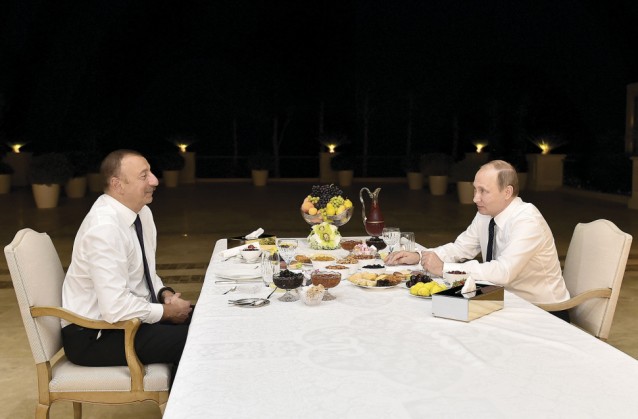 Azerbaijani president Ilham Aliyev meets with his Russian counterpart Vladimir Putin during the Russia, Iran, Azerbaijan trilateral summit on 8 August 2016 Photo: Azertaj
Azerbaijani president Ilham Aliyev meets with his Russian counterpart Vladimir Putin during the Russia, Iran, Azerbaijan trilateral summit on 8 August 2016 Photo: Azertaj
Syria and greater regional cooperation
Dialogue between Russia, Iran and Azerbaijan advances dialogue between Russia, Turkey and Iran. Iran and Turkey are largely geopolitical rivals. This rivalry is strongly entangled in the religious differences between, above all, the Shiite population of Iran and the ever more Sunni Turkey. The war in Syria is largely a proxy war between the Shiites of Iran, Lebanon, Iraq and Syria on the one hand and the Sunnis of Turkey, Syria, Saudi Arabia and Qatar on the other. Moreover, Turkey and Iran have good relations with Russia, which makes it possible for Russia to play an important role in regulating tension. Whilst Iran finds itself in a certain confrontation with Turkey over Syria, Russia insists that Turkish interests should be taken into account in Syria’s transition to peace.
Today, if peace does come to Syria the most likely scenario is that it will come in the form of a transition to a federal arrangement of the country, with a high level of autonomy for some of its regions. Moreover, in some of these regions Turkey will play a very significant role, and in others the very same role will be played by Iran.
Russia, as well as Azerbaijan, has a wonderful opportunity to help the reconciliation of Turkey and Iran. After all an alliance, I think, is hardly possible given their deep opposition. Therefore we ought to speak sooner of a reconciliation rather than of an alliance of these two regional powers. Both Russia and Azerbaijan can do much to aid this process. In the case of success they would receive significant advantages since reconciliation would allow them to develop joint projects without obstacles, reduce the capabilities of extremist groups and raise the geopolitical weight of both countries.
Bilateral relations
In such a way, Russia and Azerbaijan are natural allies in various geopolitical projects: the North-South project, developing the Moscow-Baku-Ankara trio, the Caspian format of cooperation, aiding the reconciliation of Turkey and Iran resulting in cooperation between them. But Russia and Azerbaijan also have a very broad agenda of bilateral relations, in which economics have the greatest significance. Here, there are several areas.
The first is cooperation in oil and gas. Rosneft, Russia’s largest oil company, was invited by the Azerbaijani government to participate in extraction from the Caspian shelf. This cooperation cannot be large-scale because Azerbaijan has been developing its oil and gas resources jointly with the largest transnational corporations for two decades already. As a result of international oil and gas agreements signed in Azerbaijan between 1994 and 2015, $62bn has already been invested in the industry. However, Russian companies can very much find their place in this business too.
Less well known, but very attractive, is the cooperation between the two countries in other industries – above all in the trade of agricultural products from Azerbaijan in the Russian market. In the space of a year this has grown by 45%, which is linked to Russian countersanctions against European countries. This provides the opportunity for Azerbaijani agriculture to recover the ground it lost in the post-Soviet period. Azerbaijani agriculture and agricultural manufacturing have received large investments over recent years and today are at a very high level.
A relatively new area is tourism. This means business tourism from Azerbaijan to Russia, where many Azerbaijani companies have the opportunity to develop on the huge Russian market. But also general tourism from Russia to Azerbaijan, where millions of people would like to walk through the streets of Old Baku and to see the ultra-modern architecture, such as the Flame Towers, Heydar Aliyev Centre and splendid Boulevard. Among Russian youth it has become fashionable to spend time in Baku with its ineffable Eastern flavour.
Humanitarian and cultural links are very important in Russian-Azerbaijani relations. In Russia there is a huge Azerbaijani diaspora which plays a major role in the economic life of the country. In turn, many Russian speakers live in Azerbaijan and consider Russia their second homeland. Azerbaijan is also one of the few countries in the post-Soviet space with a large Russian-speaking sector in its education system. And the Azerbaijani community in Russia was once the first ethnic community that supported the candidacy of Vladimir Putin for the post of president.
Political communication between the two leaders – Vladimir Putin and Ilham Aliyev – is perhaps the most productive in the region. Regular meetings between the two presidents and their dialogue create a fruitful environment for cooperation between other government structures and institutes. It is also generally accepted that cooperation between the two countries’ intelligence agencies is almost ideal. Mutual visits of high-ranking officials happen so often that this creates wonderful opportunities for effective work, and such links are supported by public opinion in both countries.
About the author: Sergey Markov is Director of the Russian Institute of Political Research (IPR), former Co-chairman of the Moscow Carnegie Centre, a member of the Russian Civic Chamber and Deputy Chairman of the Commission of the Civic Chamber on International Cooperation and International Diplomacy.